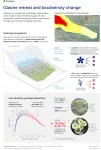(Press-News.org) (Singapore--16:45 p.m. SPT/3:45 EST January 29, 2021)--Two presentations from the ADAURA clinical trial advanced previous research that demonstrated improved disease-fee survival (DFS) outcomes for patients with surgically resected non-small cell lung cancer (NSCLC) receiving osimertinib. The data were reported today at the International Association for the Study of Lung Cancer's 2020 World Conference on Lung Cancer (WCLC) Singapore.
Osimertinib is a third-generation, irreversible, central nervous system-active, epidermal growth factor receptor (EGFR)-tyrosine kinase inhibitor. ADAURA is a randomized Phase III trial comparing adjuvant osimertinib with placebo in patients with surgically resected stage IB to IIIA (AJCC 7th edition; pathologic stage) NSCLC that harbors an activating EGFR mutation with either an exon 19 deletion or exon 21 L858R substitution. Postoperative chemotherapy was allowed, per physician and patient choice. Adult patients were randomized 1:1 and treated with osimertinib 80 mg once-daily oral tablets or placebo for three years or until disease recurrence.
In one analysis (Abstract 3505), presented by Dr. Margarita Majem, Department of Medical Oncology at the Hospital de la Santa Creu i Sant Pau, Barcelona, Spain, adjuvant osimertinib, with or without prior adjuvant chemotherapy, provided a significant DFS benefit without affecting health-related quality of life (HRQoL), a secondary endpoint of the study, in completely resected and disease-free patients with stage IB-IIIA EGFRm NSCLC.
HRQoL was assessed with the short form-36 (SF-36) health survey, which consisted of eight domains and two aggregated summary scores, physical [PCS] and mental [MCS] component summary, and was completed by patients at randomization, 12 and 24 weeks, then every 24 weeks until treatment completion or discontinuation.
The SF-36 T-scoring system assesses different physical and mental health parameters. Higher T?scores indicate better health. Survey compliance was high, at ?85% among both treatment and placebo arms.
Analysis of the survey data showed that patients treated with adjuvant osimertinib maintained their quality of life, with no clinically meaningful differences in the physical or mental health scores between the osimertinib and placebo arms (PCS -1.18 [95% CI: -2.02, -0.34]; MCS -1.34 [95% CI: ?2.40, ?0.28]. There were no differences in time to deterioration (TTD) of PCS (HR: 1.17) or MCS (HR: 0.98).
"The effect of adjuvant treatment on health-related quality of life is an important clinical consideration for patients who, following surgery with curative intent, are disease-free and require long-term treatment to reduce the risk of disease recurrence," Dr. Majem said.
In the next trial (Abstract 3464), Dr. Yi-Long Wu, one of the WCLC co-chairs and of Guangdong Lung Cancer Institute, Guangdong Provincial People's Hospital & Guangdong Academy of Medical Sciences, Guangzhou/China, presented data that adjuvant osimertinib demonstrated a highly statistically significant improvement in DFS vs placebo in patients with resected stage IB-IIIA EGFRm NSCLC. Quality of life was maintained during osimertinib treatment, with no clinically meaningful differences observed between arms.
Dr. Wu and colleagues randomly assigned patients with resected stage IB-IIIA (AJCC 7th edition; pathologic stage) EGFR-mutated NSCLC to receive 80 mg of daily osimertinib or to placebo for three years (study completion) or until disease recurrence. Disease staging was based on electronic case report forms for baseline characteristics data, and interactive voice response system (IVRS) for efficacy data (per statistical analysis plan).
In ADAURA, 60% (410/682) of all patients randomly assigned received adjuvant chemotherapy for a median duration of 4.0 (Q1: 4.0, Q3: 4.0) cycles, balanced across treatment arms. Overall, 409 patients received platinum-based chemotherapy, most with stage IIIIIA (II: 71% [165/231]; IIIA: 80% [187/235]), and fewer with stage IB (26% [57/216]), disease. Across disease stages, the overall proportion of patients who received chemotherapy was 66% in patients aged younger than 70 (338/509), compared with 42% (72/173) in patients aged 70 or older, reducing to 27% (21/78) in patients aged 75 or older.
The group that received chemotherapy (n = 230) experienced 22 DFS events (11%), and the placebo group (n = 207) experienced 103 DFS events (50%). The treatment arm that received osimertinib without chemotherapy (n = 136) experienced 15 DFS events or 11% while the placebo group that did not receive chemotherapy experienced 56 DFS events or 40% rate.
Dr. Wu reported that DFS benefit with osimertinib vs placebo for patients who received prior chemotherapy was similar to that for patients who had not received prior chemotherapy, regardless of disease stage.
"These data further support adjuvant osimertinib as a new treatment strategy in this setting, with significant DFS benefit and maintained quality of life," said Dr. Wu.
INFORMATION:
About the IASLC:
The International Association for the Study of Lung Cancer (IASLC) is the only global organization dedicated solely to the study of lung cancer and other thoracic malignancies. Founded in 1974, the association's membership includes nearly 7,500 lung cancer specialists across all disciplines in over 100 countries, forming a global network working together to conquer lung and thoracic cancers worldwide. The association also publishes the Journal of Thoracic Oncology, the primary educational and informational publication for topics relevant to the prevention, detection, diagnosis, and treatment of all thoracic malignancies. Visit http://www.iaslc.org for more information.
About the WCLC:
The WCLC is the world's largest meeting dedicated to lung cancer and other thoracic malignancies, attracting more nearly 7,500 researchers, physicians and specialists from more than 100 countries. The goal is to increase awareness, collaboration and understanding of lung cancer, and to help participants implement the latest developments across the globe. The conference will cover a wide range of disciplines and unveil several research studies and clinical trial results. For more information, visit wclc2020.iaslc.org.
Beyond the ski slopes, one of the most iconic symbols of the Alps are the alpine flowers. These plants are not only beautiful -- they are also used in liqueurs and medicines, and they form the foundation of the local food chains. But a recent study in Frontiers in Ecology and Evolution shows that, although plant diversity may initially increase with glacier retreat, many of these species may soon become endangered.
"Our results indicate that plant diversity will ultimately decrease once the glaciers disappear -- and up to 22% of the species we analyzed may locally disappear or even go extinct once the glaciers are gone," says lead author Dr Gianalberto Losapio of Stanford University in the USA. "We show that 'not all species are equal before global warming' and that there are some species ...
Methane (CH4) is the second most important greenhouse gas after carbon dioxide (CO2). Its concentration in the atmosphere has increased more than twice since the preindustrial era due to enhanced emissions from human activities. While the global warming potential of CH4 is 86 times as large as that of CO2 over 20 years, it stays in the atmosphere for about 10 years, much shorter than more than centuries of CO2. It is therefore expected that emission controlling of CH4 can benefit for relatively short time period toward the Paris Agreement target to limit the global warming well below 2 degrees.
A study by an international team, published ...
New research from the University of Sheffield has found being overweight is an additional burden on brain health and it may exacerbate Alzheimer's disease.
The pioneering multimodal neuroimaging study revealed obesity may contribute toward neural tissue vulnerability, whilst maintaining a healthy weight in mild Alzheimer's disease dementia could help to preserve brain structure.
The findings, published in The Journal of Alzheimer's Disease Reports, also highlight the impact being overweight in mid-life could have on brain health in older age.
Lead author of the study, Professor Annalena Venneri from the University of Sheffield's Neuroscience Institute and NIHR Sheffield Biomedical Research Centre, ...
Four million UK patients could benefit annually from genetic testing before being prescribed common medicines, according to new research from the University of East Anglia (UEA) in collaboration with Boots UK and Leiden University (Netherlands).
Researchers looked through 2019 NHS dispensing data across the UK to see how many patients are started on new prescriptions each year that could be potentially optimised by genetic testing.
They studied 56 medicines, including antidepressants, antibiotics, stomach ulcer treatments and painkillers where there are known drug-gene interactions.
And they found that in more than one in five occasions (21.1 ...
An interdisciplinary team of the Institut national de la recherche scientifique (INRS) used an innovative imaging technique for a better understanding of motor deficits in Amyotrophic Lateral Sclerosis (ALS). The researchers were able to follow the escape behaviour of normal and disease zebrafish models, in 3D. Their results have recently been published in Optica, the flagship journal of the Optical Society (OSA).
Professor Jinyang Liang, expert in ultra-fast imaging and biophotonics, joined an effort with Professor Kessen Patten, specialist in genetics and neurodegenerative diseases. The two groups were able to track the position of ...
New research from the University of Iowa and University Hospitals Cleveland Medical Center demonstrates that offspring can be protected from the effects of prenatal stress by administering a neuroprotective compound during pregnancy.
Working in a mouse model, Rachel Schroeder, a student in the UI Interdisciplinary Graduate Program in Neuroscience, drew a connection between the work of her two mentors, Hanna Stevens, MD, PhD, UI associate professor of psychiatry and Ida P. Haller Chair of Child and Adolescent Psychiatry, and Andrew A. Pieper, MD, PhD, a former UI faculty member, now Morley-Mather Chair of Neuropsychiatry at Case Western Reserve ...
-- Experts call for policy reform to improve ethnic equity of socioeconomic opportunity, service provision, and health outcomes. They also call for long-term studies to investigate how structural and institutional racism generate these ethnic inequalities in health.
In 15 out of 17 minority ethnic groups, health-related quality of life in older age (over 55 year-olds) was worse on average for either men, women, or both, than for White British people according to an observational study published in The Lancet Public Health journal.
In five of those groups - Bangladeshi, Pakistani, ...
Peer-reviewed / Simulation or Modelling / People
A new modelling study has estimated that from 2000 to 2030 vaccination against 10 major pathogens - including measles, rotavirus, HPV and hepatitis B - will have prevented 69 million deaths in low-income and middle-income countries (LMICs).
The study estimated that, as a result of vaccination programmes, those born in 2019 will experience 72% lower mortality from the 10 diseases over their lifetime than if there was no immunisation.
The greatest impact of vaccination was estimated to occur in children under five - mortality from the 10 diseases in ...
Cities are not all the same, or at least their evolution isn't, according to new research from the University of Colorado Boulder.
These findings, out this week in Nature Communications Earth and Environment and Earth System Science Data, buck the historical view that most cities in the United States developed in similar ways. Using a century's worth of urban spatial data, the researchers found a long history of urban size (how big a place is) "decoupling" from urban form (the shape and structure of a city), leading to cities not all evolving the same--or even close.
The researchers hope that by providing this look at the past with this unique data set, they'll be able to glimpse the future, including the impact of population growth on cities or ...
Boulder, Colo., USA: For most of Earth's history, life was limited to the microscopic realm, with bacteria occupying nearly every possible niche. Life is generally thought to have evolved in some of the most extreme environments, like hydrothermal vents deep in the ocean or hot springs that still simmer in Yellowstone. Much of what we know about the evolution of life comes from the rock record, which preserves rare fossils of bacteria from billions of years ago. But that record is steeped in controversy, with each new discovery (rightfully) critiqued, questioned, and analyzed from every angle. Even then, uncertainty ...





